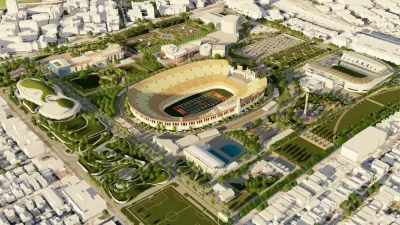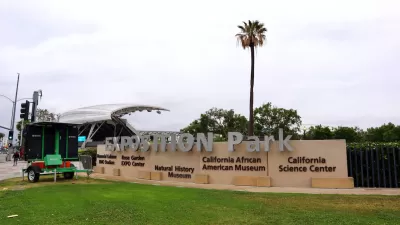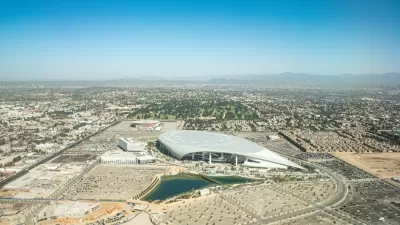Critics say the HUD program is meant to fund more direct anti-poverty measures, like affordable housing—not office, retail, and attractions.

Los Angeles city council recently voted to ask HUD for a loan of $22.5 million to fund commercial development around the MLS soccer stadium, slated to open in Exposition Park in 2018. Johnny Magdaleno explains in NextCity:
Through the Department of Housing and Urban Development’s Section 108 program, cities can qualify for low-interest loans to fill small funding gaps for development projects if these projects promise to give up to 51 percent of the jobs they create to low-income populations, and act as an economic boon for surrounding communities. The average loan amount is $4.9 million, and cities usually get between 10 and 20 years to pay them off.
Typically, the funds are awarded for community revitalization and anti-poverty projects. Even considering job creation, critics argue that construction of a sports museum, culinary academy, and conference center, among other things, would not be a faithful application of the program.
"When it comes to massive projects like a stadium, the long-term economic impacts on nearby communities are usually neutral or slightly negative," Magdaleno notes. And if anti-poverty funds get "eaten up" by a bad project, "it’s a double blow to the disadvantaged citizens these federal programs were crafted for."
He adds:
At the same time it’s giving out resources to commercial and industrial projects, HUD continues to slash funding for its affordable housing initiatives, and as of 2015 federal spending on housing assistance was $2.9 billion under what it was in 2004. That’s despite the fact that the number of families with access to rental assistance is at its lowest point in a decade, while demand is on the rise.
FULL STORY: L.A. Asks HUD to Back Private Sports Complex

Planetizen Federal Action Tracker
A weekly monitor of how Trump’s orders and actions are impacting planners and planning in America.

Congressman Proposes Bill to Rename DC Metro “Trump Train”
The Make Autorail Great Again Act would withhold federal funding to the system until the Washington Metropolitan Area Transit Authority (WMATA), rebrands as the Washington Metropolitan Authority for Greater Access (WMAGA).

DARTSpace Platform Streamlines Dallas TOD Application Process
The Dallas transit agency hopes a shorter permitting timeline will boost transit-oriented development around rail stations.

Parks: Essential Community Infrastructure — and a Smart Investment
Even during times of budget constraint, continued investment in parks is critical, as they provide proven benefits to public health, safety, climate resilience, and community well-being — particularly for under-resourced communities.

Porches, Pets, and the People We Grow Old With
Neighborhood connections and animal companions matter to aging with dignity, and how we build can support them. Here’s a human-scale proposal for aging in place.

Single-Stair Design Contest Envisions Human-Scale Buildings
Single-stair building construction is having a resurgence in the United States, where, for the last several decades, zoning codes have required more than one staircase in multi-story housing developments.
Urban Design for Planners 1: Software Tools
This six-course series explores essential urban design concepts using open source software and equips planners with the tools they need to participate fully in the urban design process.
Planning for Universal Design
Learn the tools for implementing Universal Design in planning regulations.
City of Charlotte
Municipality of Princeton
City of Camden Redevelopment Agency
City of Astoria
Transportation Research & Education Center (TREC) at Portland State University
US High Speed Rail Association
City of Camden Redevelopment Agency
Municipality of Princeton (NJ)





























